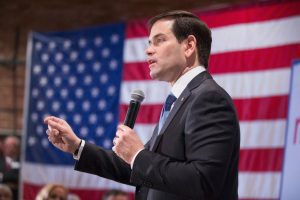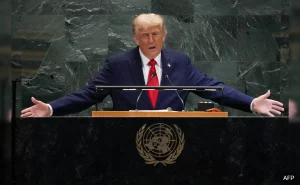Washington D.C. – America is seeking to resolve the punitive tariffs imposed on Indian goods, with Marco Rubio On US India Ties stressing the need for progress. In a recent interview, the US secretary of state Marco Rubio said Washington was working toward resolving the 25% levy linked to India’s Russian oil purchases. Rubio noted that discussions with Indian counterparts were ongoing and making “a lot of progress.”
The tariff, which combines a baseline 25% levy with an additional penalty, has become a central obstacle in bilateral trade relations. India has consistently described the duties as “unreasonable and unjustified,” while pressing for reductions to ease its exporters’ burden.
Strategic Dialogue at UNGA

On the sidelines of the 80th United Nations General Assembly in New York, Marco Rubio On US India Ties emphasized that the partnership remains “critically important.” His meeting with India’s external affairs minister S. Jaishankar marked the first in-person dialogue since tensions escalated in July.
The two sides discussed trade, defense cooperation, energy, pharmaceuticals, and critical minerals. A joint readout confirmed commitments to continue collaboration, particularly through the Quad framework, to maintain a free and open Indo-Pacific region.
Visa Fee Concerns for Indian Professionals


A parallel development affecting relations was Washington’s announcement of a $100,000 application fee for H-1B visas. Marco Rubio On US India Ties acknowledged concerns, as the fee disproportionately impacts Indian professionals who account for over 70% of successful applications.
The H-1B program, critical to Silicon Valley’s workforce since 1990, has faced criticism within the US for allegedly displacing American workers. Major Indian IT companies like Infosys and Tata Consultancy Services are among its top sponsors. However, US officials clarified that the new fee applies only to fresh applications in upcoming cycles and not as a recurring annual charge.
Ongoing Trade Negotiations
Commerce minister Piyush Goyal met US Trade Representative Jamieson Greer in New York to push forward negotiations. This was their third meeting this year following earlier sessions in March and May. Marco Rubio On US India Ties highlighted that the United States seeks wider market access for agricultural products, while India prioritizes tariff reductions.
Talks had stalled in August when Washington abruptly canceled a delegation’s visit. The dynamic shifted in September, however, after positive exchanges between Prime Minister Narendra Modi and President Trump signaled renewed momentum. Trump later expressed optimism that a deal could be concluded quickly.
Also Read: Rubio Jaishankar Meeting: Powerful India Critical Importance Declaration
Aiming for Agreement by November
Following the Trump-Modi outreach, Marco Rubio On US India Ties has taken on greater significance as both governments push for a breakthrough. Sergio Gor, Trump’s nominee for ambassador to India, suggested an agreement could materialize within weeks. Goyal has also expressed hope for conclusion before November.
Despite differences on agricultural access and reciprocity in tariffs, negotiators on both sides are now focused on crafting a mutually beneficial arrangement. Indian officials remain intent on reducing the 50% combined tariff burden, while Washington presses for concessions on trade barriers.
Wider Geopolitical Stakes
The tariff issue is not only economic but also strategic. Marco Rubio On US India Ties noted that European nations may soon face calls to join secondary sanctions on Moscow, which could affect India’s energy imports. While New Delhi seeks balanced ties with multiple partners, Washington views stronger alignment with India as essential to countering regional challenges.
The Indo-Pacific remains a focal point, with both governments committed to upholding stability through partnerships like the Quad. As global supply chains shift, cooperation in critical minerals and pharmaceuticals is emerging as another strategic priority.
Balancing Domestic Pressures
Within the US, domestic political pressure to protect workers has shaped policy decisions. Marco Rubio On US India Ties acknowledged these challenges but underlined the importance of sustaining one of America’s most vital global partnerships. The new visa fee, while controversial, reflects this balancing act.
For India, the focus remains on safeguarding its exporters and professionals while preserving access to American markets. By keeping negotiations alive, both nations hope to demonstrate resilience in their strategic partnership despite periodic disagreements.
Outlook Ahead
Key officials suggest momentum is finally returning after months of setbacks. The Indian commerce ministry confirmed its intent to continue discussions for an “early conclusion of a mutually beneficial Trade Agreement.” Marco Rubio On US India Ties continues to underscore optimism, indicating that resolution on tariffs, visa concerns, and market access is achievable within months.
With strategic, economic, and geopolitical factors converging, the trajectory of India-US relations remains closely watched. Whether or not an agreement is reached by November, both governments appear committed to advancing their shared vision for a stronger and more resilient partnership.

